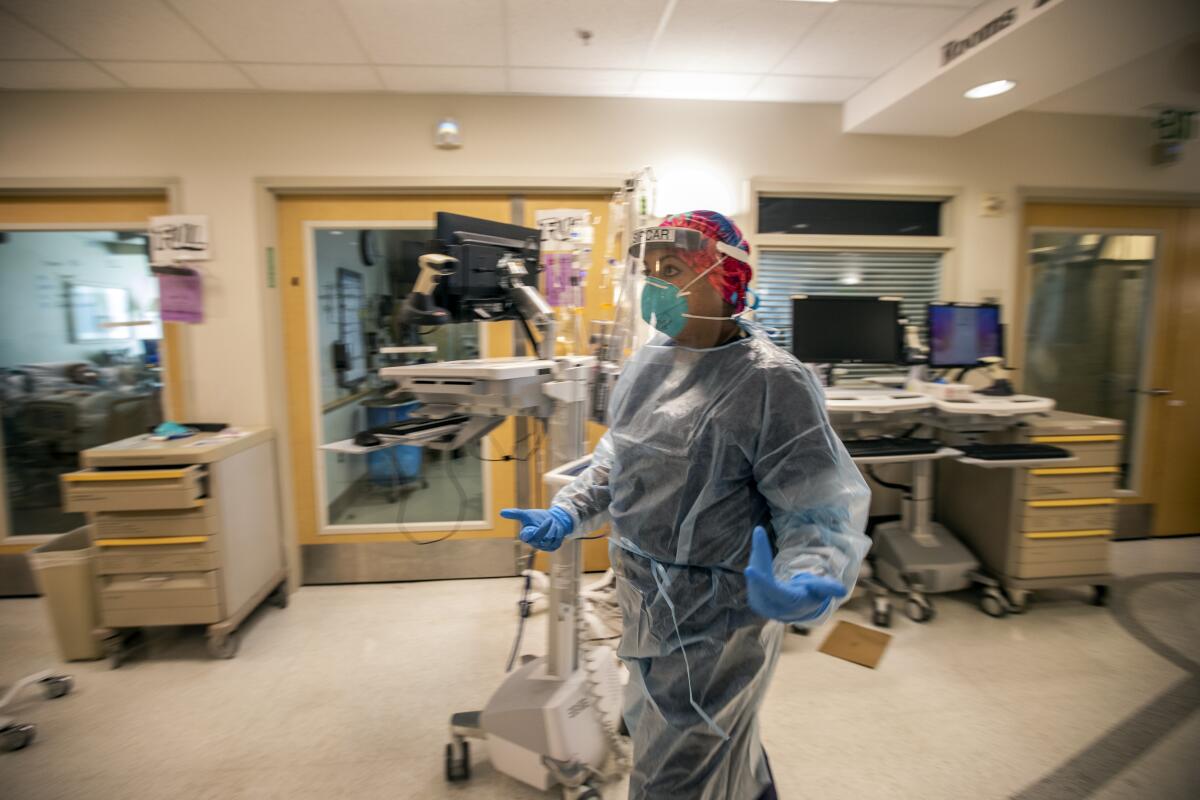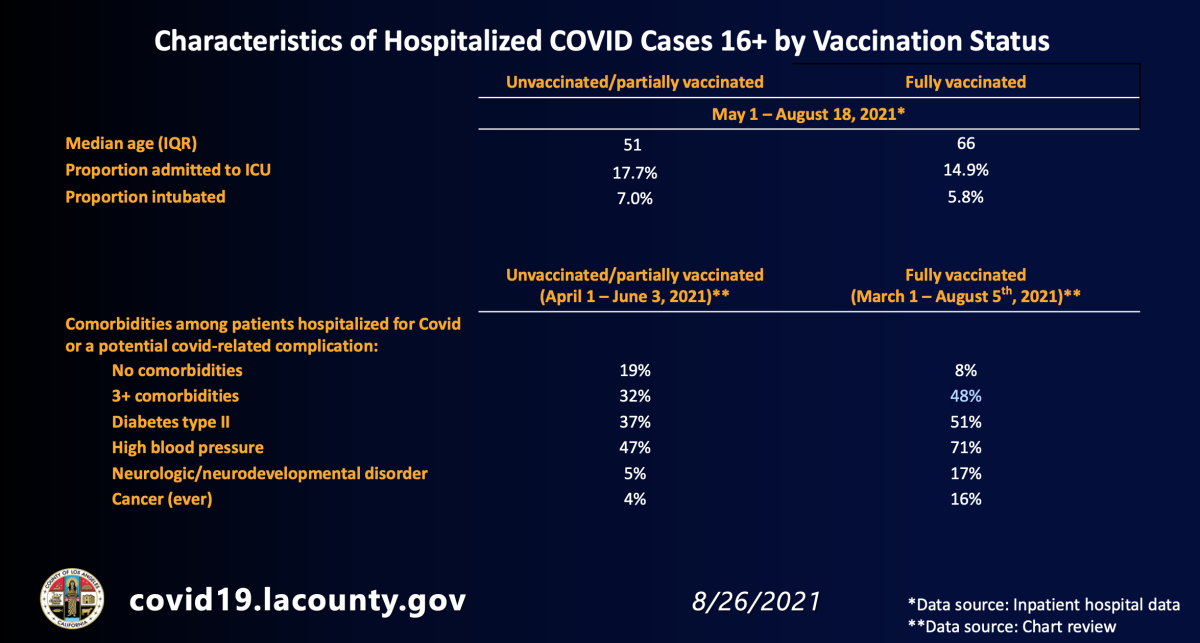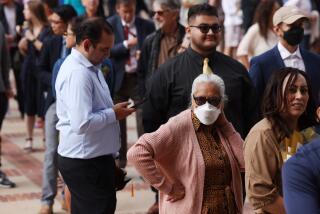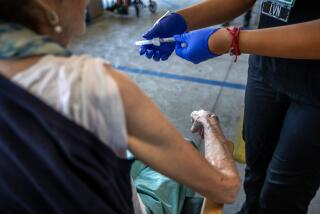Hospitals see more unvaccinated, younger, healthier people with COVID-19

Hospitals are seeing a greater number of unvaccinated people who are younger and otherwise healthier fill up their beds, according to new data released by Los Angeles County.
Among adults and the oldest teenagers who are hospitalized with COVID-19, the median age of unvaccinated or partially vaccinated patients was 51. That’s notably younger than the median age of fully vaccinated patients in the hospital with COVID-19, which was 66.
Fully vaccinated people were also less likely to need admission into the intensive care unit or to have such difficulty breathing that they need to be sedated and have a breathing tube inserted into their mouth and into the windpipe.
“These findings suggest that vaccination contributes to a less severe course of hospitalization among people who end up infected with COVID,” L.A. County Public Health Director Barbara Ferrer said. “And it also lets us know that the majority of people who are fully vaccinated — and end up hospitalized with COVID — are likely to be much older than people who are unvaccinated.”
In addition, unvaccinated and relatively healthy people were more likely to be hospitalized than their vaccinated counterparts.
About 1 in 12 fully vaccinated people hospitalized with COVID-19 had no underlying health conditions. By contrast, 1 in 5 unvaccinated or partially vaccinated people hospitalized with COVID-19 had no underlying health conditions.
“Fully vaccinated people who were sick enough to require hospitalization were much more likely, as you can see here, to have chronic diseases,” Ferrer said.

Orange County has also observed that COVID-19 patients who are now hospitalized tend to be younger, said Dr. Clayton Chau, the county health officer.
Many of those now hospitalized with COVID-19 are unvaccinated people in their 30s and 40s, Chau said.
At Fountain Valley Regional Hospital, the average age of people admitted for hospital treatment in January was 64. Now, it’s 46, said Dr. Timothy Korber, the hospital’s medical director of emergency services.
“Early on, we really pushed as a country to try to vaccinate people who were older, initially, and then with comorbidities,” Korber told reporters in a briefing. “What’s happening now is you’re seeing a more aggressive Delta variant that is hitting some of these younger people harder than the original variant was. And as a result, those end up in the hospital.
“The vast majority of the cases that we’re admitting to the hospital are unvaccinated, younger and being admitted because they have serious respiratory complaints, including pneumonia and/or hypoxia,” or low levels of oxygen in the blood, Korber said.
A big reason why hospitals are seeing this change is that younger adults are still less likely to be fully vaccinated than older adults. In Los Angeles County, 73% of adults 50 or older have been fully vaccinated, but only 58% of younger adults have received the full course of inoculation.
Though severe cases and hospitalizations from COVID-19 in children still remain far less common than in adults, there has been an increase in pediatric coronavirus cases and hospitalizations over the last few weeks, said Dr. Rochelle Walensky, director of the U.S. Centers for Disease Control and Prevention.
The increase in pediatric cases “is likely the result of overall increases in community transmission generally, and more specifically, the Delta variant’s increased transmissibility,” Walensky said.
Though the CDC has touted guidelines and toolkits for schools around vaccinations, masks, ventilation, social distancing and screening testing, Walensky said, “unfortunately, many schools have opted not to implement these recommended tools.”
“Large-scale quarantines or large number of cases are generally occurring in schools because schools are not following our guidance, particularly our recommendations for teachers, as well as students aged 12 and over, to be vaccinated and for everyone right now to be masked,” Walensky said.
The Culver City Unified School District recently issued a COVID-19 vaccination requirement for all eligible students — believed to be the first such requirement in California — with a deadline of Nov. 19.
Walensky said recommendations on controlling the pandemic in classrooms do work, but they have to be followed.
A recent study published by the CDC concluded that COVID-19 control policies in Los Angeles County schools open in the last academic year “provided a relatively safe environment.”
But in Marin County, one unvaccinated, unmasked elementary school teacher came to work in May despite being visibly ill and infected a dozen of her students, despite rules in place requiring everyone to wear masks in indoor settings at school.
With schools only just starting, many officials say it’s too early to know whether the peak of the fourth pandemic wave has passed. Officials in Los Angeles County recently said they are starting to observe a slight downturn in new daily coronavirus cases but expect the numbers to remain relatively high as more people undergo routine testing in the coming weeks.
Among unvaccinated children ages 12 to 18, the coronavirus case rate has risen to 307 new cases per 100,000 youths, up from 73, the L.A. County Department of Public Health reported Saturday.
“It is important to note that while cases among children increased across the board, there is a four-fold difference in the case rate between vaccinated and unvaccinated children,” county health officials said in a statement.
Chau said that he was “cautiously hopeful” Orange County was over the peak of coronavirus cases amid the surge. But he said it all depends on what happens as more children go back to school. He said that if kids are being careful and wearing masks indoors at school, more infections can be avoided.
Though hospitalizations are nowhere near the previous winter surge, Chau said hospitals are still feeling strained. More than 90% of hospitalized COVID-19 patients are unvaccinated, Chau said.
The children hospitalized at Children’s Hospital Orange County were coming from families in which adults and kids were unvaccinated, Chau said, and the children are either too young to get the shot or were eligible but hadn’t received it.
Chau said he was frustrated by the number of unvaccinated adults 25 to 34 years old dying of COVID-19.
“It is unnecessary deaths,” Chau said. “I mean, yes, the number is nothing compared to the last surge in wintertime, but people don’t have to die if they just get the vaccine.”
Federal officials said they were encouraged that the pace of vaccinations has picked up. So far this month, nearly 12.5 million first doses of vaccinations have been administered nationwide; that’s already 2 million more than in all of July, Jeff Zients, coordinator for the White House’s COVID-19 task force, said in a news briefing.
Zients also pointed out “critical progress” being made as the school year gets underway, with half of adolescents and teens ages 12 to 17 having received at least their first vaccine dose.
President Biden recently called on employers to require their workers “get vaccinated or face strict requirements.”
“Vaccination requirements have been around for decades. Students, healthcare professionals, our troops are typically required to receive vaccination to prevent everything from polio to smallpox, measles, mumps, rubella,” Biden said.
The U.S. Food and Drug Administration recently granted full approval to the Pfizer-BioNTech vaccine for people 16 and older, an endorsement that experts hope will dramatically boost vaccination rates. Until that decision was made, all three COVID-19 vaccines administered in the U.S. had been given only emergency-use authorization.
Zients pointed to the growing number of institutions adopting vaccine requirements including 800 colleges and universities, more than 200 healthcare employers, large and small businesses across the country and state and local governments. Federal authorities have ordered full vaccination of all members of the armed forces under the authority of the Department of Defense on active duty.
San Francisco recently enacted an order requiring proof of full vaccination for customers to enter gyms, restaurants and bars. Louisiana State University said it would require proof of vaccination or a recent negative test to attend a football game this fall for guests 12 and older.
“If you’re an American who is not yet vaccinated, or if you’re an employer who has yet to adopt vaccination requirements, we have a very simple message: Get off the sidelines, step up and do your part,” Zients said.
Times staff writers Melissa Gomez, Maura Dolan and Emily Baumgaertner contributed to this report.
More to Read
Sign up for Essential California
The most important California stories and recommendations in your inbox every morning.
You may occasionally receive promotional content from the Los Angeles Times.












